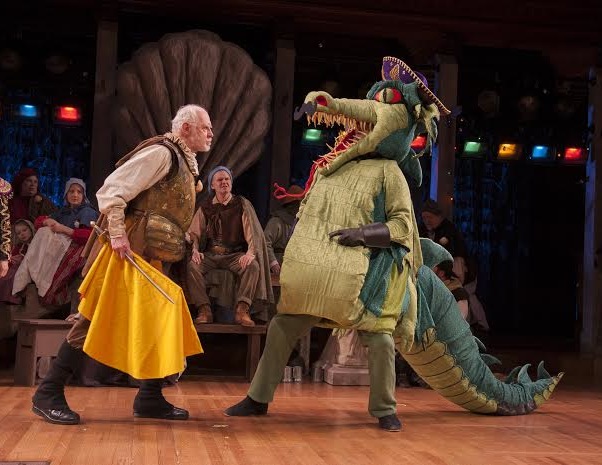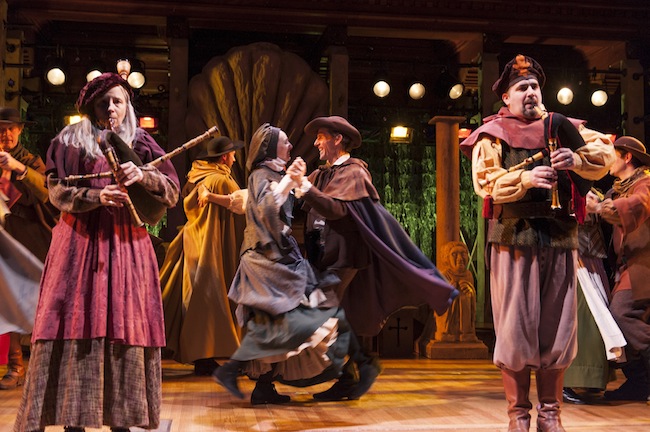Theater Review: “The Christmas Revels” — A Joyous Sing-Along, A Love-In, and A Meet and Greet
People come to The Christmas Revels to immerse themselves in memories of holidays past, before Toys R Us and “Rudolph the Red-Nosed Reindeer” co-opted the celebration. This year, as in years past, mission accomplished.
The Christmas Revels: In Celebration of the Winter Solstice. Directed by Patrick Swanson. Music direction by George Emlen. Staged at Sanders Theatre, Memorial Hall, Harvard University, Cambridge, MA, through December 27.

Everyman (Jay O’Callahan) battles “the Dragon bold” in this year’s mummers play (a play within The Christmas Revels). Photo: Roger Ide.
By Iris Fanger
The community sing-along/love-in/meet-and-greet known as Christmas Revels is in full tilt these next two weekends, bookending the holiday. Those of us who are fans know what to expect: a large cast of adorable children and their elders (singers, dancers, musicians, and other stage-worthy folk) performing a Yule-tide story that is blessedly free of commercial taint and sugary seasonal clichés. You can count on not hearing anything like the music from the Sanders Theatre stage when you are shopping in the nearby malls or department stores. In the latter, muzak rules.
Now in its 43rd annual showing, the 2013 Christmas Revels is larger and more ambitious than ever. Sprung from a glimmer in the voice of the late John Langstaff, the show is based on pagan and Christian folk rituals inspired by the winter solstice, ranging from medieval customs to modern times, as practiced in various countries or regions. The current production takes us to medieval Spain and the Way of the Pilgrims, the multiple pathways to Santiago de Compostela. Fellowship and music are the glue that has held this singular theatrical occasion together over the years, an event that is dedicated to creating an expansive communal experience at the darkest time of the year.
Led by the genial and authoritative David Coffin, the current master of ceremonies who has been participating in Revels since 1980, the viewers are enticed into singing along, lifting their voices and raising their arms in a fist-banging gesture, eventually linking hands with the people seated on either side. The group-sing is as much a part of the Revels tradition as the line dance (to the tune of “Lord of the Dance”) led by Coffin that brings the audience out into the transept of Memorial Church at intermission. Also repeated each year is the appearance of one or another of the local groups of Morris Men, the recitation of Susan Cooper’s poem “The Shortest Day,” the final song, “God Bless the Master of This House” (an extant Carol from a Sussex Mummers’ folk play), and a solemn rendition of “Dona Nobis Pacem” (Give Us Peace).
The leading actors in this year’s cast include the wonderful story-teller, Jay O’Callahan, in the role of Everyman who transforms into Don Quixote, the fine character actor Billy Meleady as his side-kick Sancho Panza, and Angelica Aragon, a well-known actress in the Mexican film world, playing an earthy incarnation of Dulcinea. Salome Sandoval, a vocal specialist in early music who was born in Venezuela and harpist Christa Patton are also stand-outs among the company. The nearly three-hour long evening has been staged and written by long-time Revels artistic director Patrick Swanson, with George Emlen continuing as music director. New instruments brought in this year because the production is set in Galicia, are the “gaitas,” bagpipes played by Ms. Patton and Daniel Meyers. The instruments are valuable reminders of the Celtic heritage which connects the region to the Celts of Scotland and Ireland. Emlen has done an impressive job of coordinating a score that includes fascinating period music from Spain.
The Sanders Theatre stage has been decked out by scenic designer Jeremy Barnett and lighting designer Jeff Adelberg in granite-colored, Romanesque arches, finished by a tower of bells. A squat stone angel sits crouching beneath a pillar. An actual model of the 12th century Cathedral is carried on stage by an Archbishop and two young acolytes, a ceremonial vision completed by the appearance of a replica of the brass censor swinging up and overhead belching smoke, as if the viewers were attending services in this venerable church. The costumes by Heidi A. Hermiller for the 85 performers and musicians are as decorative as the scenery.
As a huge fan of Revels for its nearly four decade run, I see little reason to point out the inconsistencies in this year’s ambitious scenario. However, for those keeping score, I might mention that the actual pilgrimage to Santiago takes place each year in July, and that the Revels itinerary detours from that road into the 15th century morality play Everyman, which was originally written in Dutch. Don Quixote and Sancho Panza are added to the journey for good measure. The “Toreador Song” (from Act II of Bizet’s opera Carmen) accompanies the performance of the Mummers’ play, a jarring anachronism that deserves at least a giggle or two. Of course, no one comes to Revels for a coherent, historically correct story-line. They come but to immerse themselves in memories of Christmas past, before Toys R Us and “Rudolph the Red-Nosed Reindeer” co-opted the holiday mirth. This year, as in years past, mission accomplished.
Iris Fanger is a theater and dance critic based in Boston. She has written reviews and feature articles for the Boston Herald, Boston Phoenix, Christian Science Monitor, New York Times, and Patriot Ledger as well as for Dance Magazine and Dancing Times (London).
Former director of the Harvard Summer Dance Center, 1977-1995, she has taught at Lesley Graduate School and Tufts University, as well as Harvard and M.I.T. She received the 2005 Dance Champion Award from the Boston Dance Alliance and in 2008, the Outstanding Career Achievement Award from the Graduate School of Arts and Sciences at Tufts. She lectures widely on dance and theater history.

